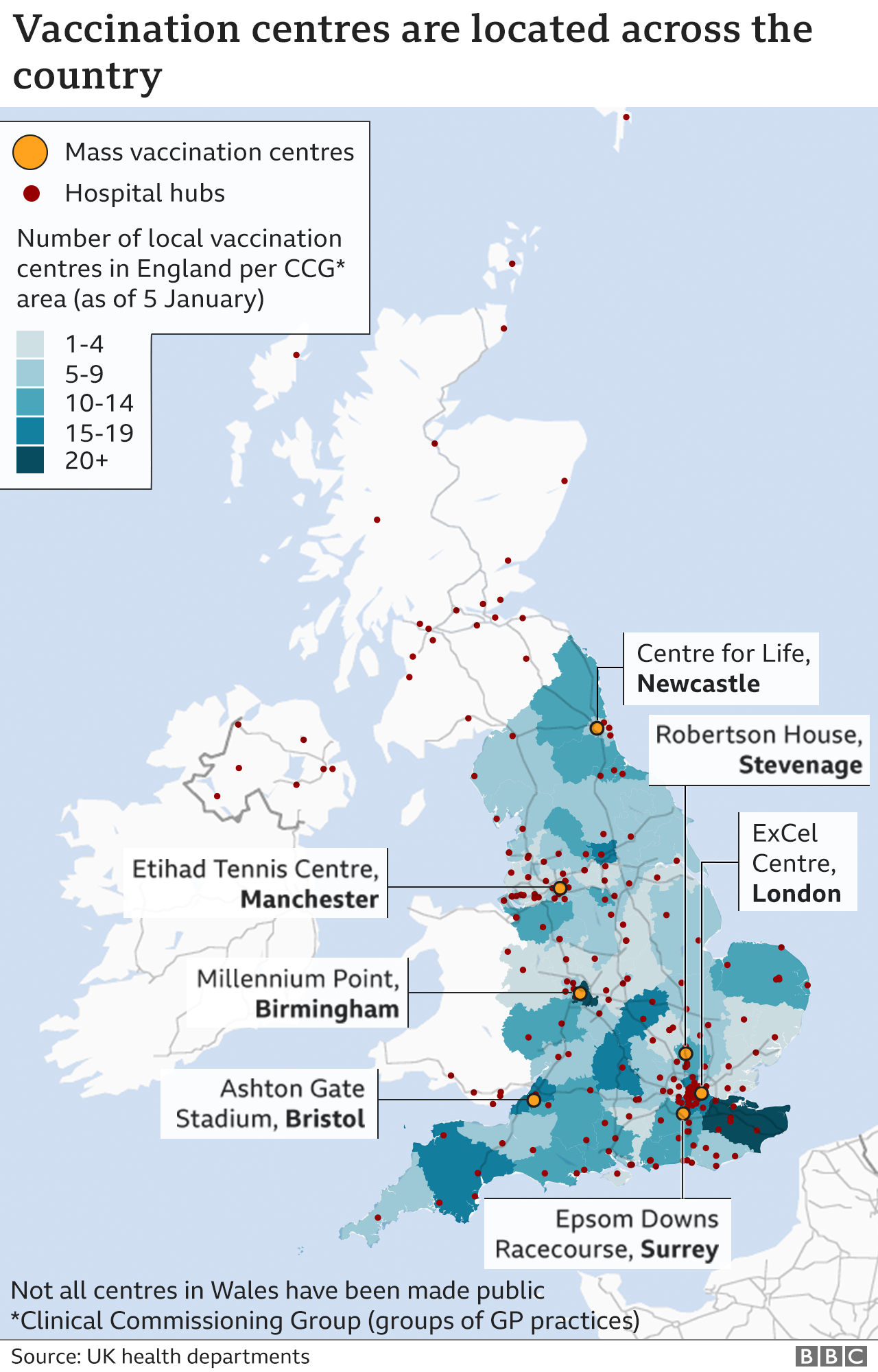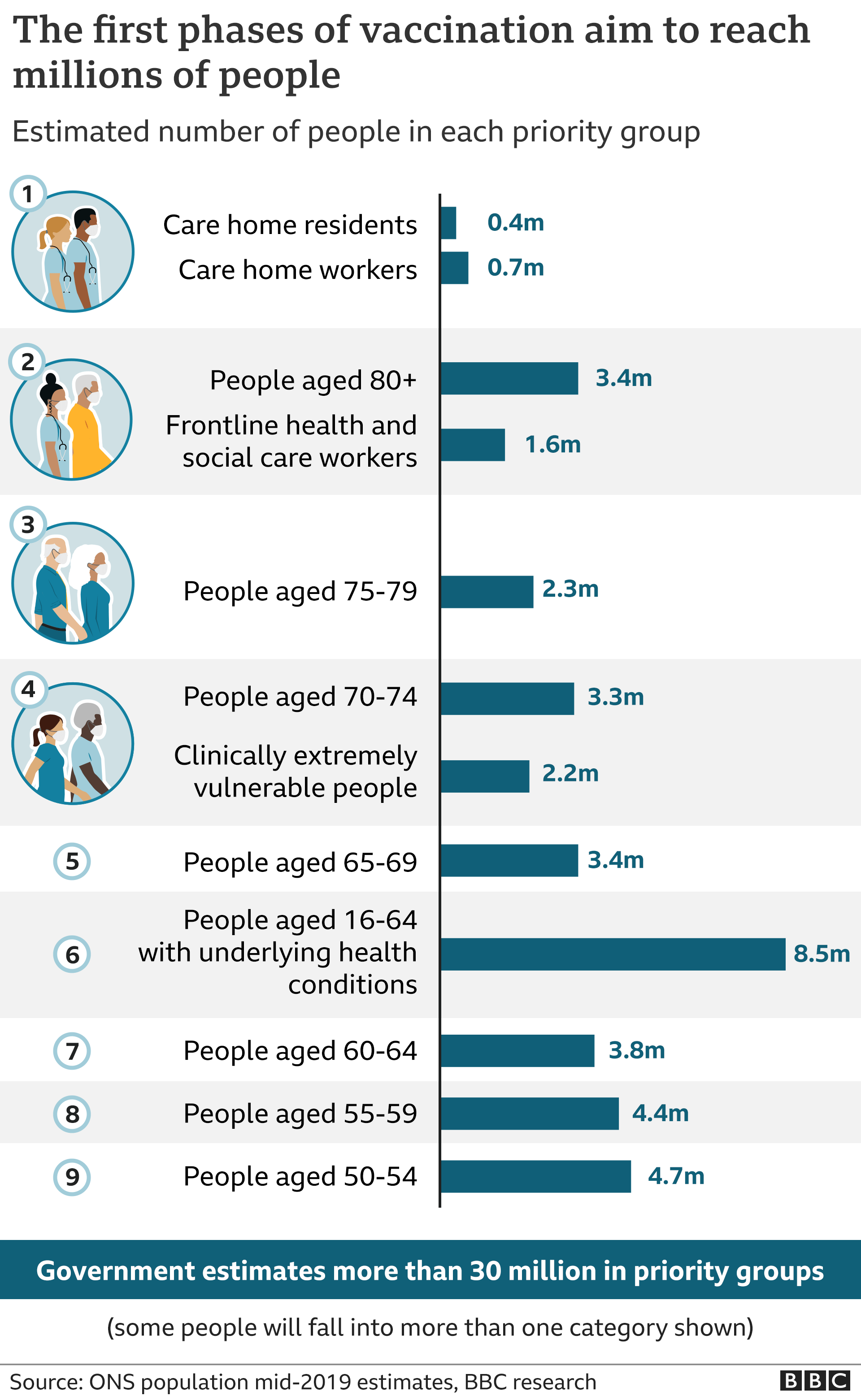Prof Chris Whitty urged people to minimise all unnecessary contact with other people.
The next few weeks will be "the worst" of the pandemic for the NHS, he said.
Thousands more people are due to receive a vaccine this week after seven mass centres opened across England.
NHS England said hundreds more GP-led and hospital services would also open later this week.
The government is aiming to vaccinate around 15 million people in the UK - the over-70s, healthcare workers and those required to shield - by mid-February.
Prof Whitty told BBC One's Breakfast: "This is everybody's problem. Any single unnecessary contact you have with someone is a potential link in a chain of transmission that will lead to a vulnerable person."
He said there were over 30,000 people [in English hospitals alone] with Covid-19 - compared to about 18,000 [in England] at the peak last April.
He added that "anybody who is not shocked" by the number of people in hospital "has not understood this at all".
"This is an appalling situation," he said.
Health Secretary Matt Hancock will set out the government's vaccine delivery plan at a news conference later.
He said the proposals would be the "keystone of our exit out of the pandemic".
The government will also publish its first daily figures which will reveal how many people have been given the vaccine.
Mr Hancock said on Sunday about two million people in the UK had been vaccinated, with some 200,000 jabs administered in England daily.
The vaccine plan will be unveiled after the UK recorded more than 80,000 coronavirus deaths since the start of the pandemic.
Around one in 50 people is infected across the UK.
The rate is as high as one in 20 in some parts of London, Prof Whitty told BBC Radio 4's Today programme, adding: "There's a very high chance that if you meet someone unnecessarily they will have Covid."
In Surrey, which has one of the highest infection rates in the country, a temporary mortuary has been opened as hospital mortuaries have reached capacity.
Almost 200 bodies are being stored at the emergency site, which is a former military hospital, and other local authorities have told the BBC they expect to open similar facilities soon.
On Saturday scientists warned stricter lockdown measures might be needed in England and the health secretary has urged people to follow the spirit as well as the letter of the rules.
Mr Hancock told the BBC's Andrew Marr Show on Sunday "every time you try to flex the rules that could be fatal" and said staying at home was the "most important thing we can do collectively as a society".
Under the national lockdown, people in England must stay at home and can go out only for limited reasons such as food shopping, exercise, or work if they cannot do so from home.
The lockdown guidelines allow people to meet one other person from another household in an open public space for exercise, limited to once a day - but Prof Whitty said exercise "should be minimised with other people".
Ministers held two meetings on Sunday to discuss how to enforce the current lockdown measures more strictly and whether even tighter restrictions may be needed.
BBC political correspondent Iain Watson said no decisions on further restrictions were taken as there was a desire within government to wait until reliable data on the impact of the existing measures becomes available in 10 days before going any further.
However, he added there had been a discussion on better enforcement of existing regulations which included how to ensure shops and workplaces that have remained open were observing health and safety rules, including social distancing.


The vaccination programme is described as the biggest in NHS history, with an aim of offering jabs to most care home residents by the end of January and the most vulnerable by mid-February.
Some 600,000 invites were due to be sent out over the weekend and this coming week to people aged 80 or older who live up to a 45-minute drive from one of the new regional centres.
The new sites, which NHS England said were chosen to give a geographical spread covering as many people as possible, are:
- Millennium Point, Birmingham
- Ashton Gate, Bristol
- ExCel Centre, London
- Manchester Tennis and Football Centre
- Centre for Life, Newcastle-upon-Tyne
- Robertson House, Stevenage
- Epsom Downs Racecourse, Surrey
However, some vulnerable people have questioned why they have been asked to travel to centres miles away from their homes during a pandemic.
The NHS said people would not miss out on their vaccination if they do not use the letters to make an appointment at one of the centres, adding that local jabs would become available to people if they waited.
Two Labour MPs also raised concerns about the letters being delayed in getting out to people due to coronavirus affecting Royal Mail staff.

- LOOK-UP TOOL: How many cases in your area?
- YOUR QUESTIONS: We answer your queries
- GLOBAL SPREAD: How many worldwide cases are there?
- THE R NUMBER: What it means and why it matters

The new centres will each be capable of delivering thousands of vaccinations each week and will be followed by "dozens more" large-scale sites, NHS England said.
There will be about 1,200 vaccination sites when more GP-led and hospital services open later this week, along with the first pharmacy-led pilot sites, it added.
Vaccines minister Nadhim Zahawi said nobody should be asked to travel more than 10 miles to get a vaccine once more centres open.
Asked on Today why the centres were not open 24 hours a day, he said it was "more convenient" for older people to attend during the day.
But he cautioned: "We are limited by the amount of vaccine that is coming through the system".
He said ministers "don't want to use tougher measures" to stem the spread of the virus, but he was "worried" about whether people were wearing masks and following social distancing at supermarkets, as well as by pictures of social interactions in parks.
"If you have to exercise you can go out for exercise only," he said.
Prof Stephen Powis, NHS England national medical director, said the NHS was "really under intense pressure" and "this is much bigger than the first wave back in April".
"I don't think anyone in the NHS has known anything like this, this is a once-in-a-century pandemic," he said.
"Nobody in their professional careers would have had to deal with the pressure that they're currently dealing with. Our staff are doing an absolutely magnificent job, but everybody must do their part to help them."


Pharmaceutical firm Boots said its first vaccination site was due to open later this week to offer the Oxford-AstraZeneca jab to the people most vulnerable.
It said sites in Huddersfield and Gloucester were planned to open in the coming weeks.
And Scotland is starting its wider rollout of the Oxford vaccine at more than 1,100 locations from today.
Two vaccines - Pfizer-BioNTech and Oxford-AstraZeneca - are currently being administered in the UK.
On Friday a third coronavirus vaccine - made by US company Moderna - was approved for use, although supplies are not expected to arrive until spring.

- LOCKDOWN LEARNING: Lesson support available on BBC Bitesize for every child, of every age, every day of the week
- BITESIZE DAILY ON BBC IPLAYER: Help is at hand for your homeschooling needs


Are you due to have a vaccination today? What has been your experience of receiving a vaccination? Email: haveyoursay@bbc.co.uk.
- WhatsApp: +44 7756 165803
- Tweet: @BBC_HaveYourSay
- Or please use the form below
- Please read our terms & conditions and privacy policy
If you are reading this page and can't see the form you will need to visit the mobile version of the BBC website to submit your question or comment or you can email us at HaveYourSay@bbc.co.uk. Please include your name, age and location with any submission.
World - Latest - Google News
January 11, 2021 at 05:01PM
https://ift.tt/3nt6nL7
Covid: 'Most dangerous time' of the pandemic, says Whitty - BBC News
World - Latest - Google News
https://ift.tt/2SeTG7d
Bagikan Berita Ini














0 Response to "Covid: 'Most dangerous time' of the pandemic, says Whitty - BBC News"
Post a Comment